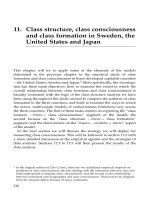0521837685 cambridge university press how institutions evolve the political economy of skills in germany britain the united states and japan sep 2004
Bạn đang xem bản rút gọn của tài liệu. Xem và tải ngay bản đầy đủ của tài liệu tại đây (1.84 MB, 353 trang )
P1: KcS
0521837685pre
Thelen
0521837685
June 19, 2004
10:36
This page intentionally left blank
ii
P1: KcS
0521837685pre
Thelen
0521837685
June 19, 2004
10:36
How Institutions Evolve
The Political Economy of Skills in Germany, Britain,
the United States, and Japan
The institutional arrangements governing skill formation are widely seen as
constituting a key element in the institutional constellations that define distinctive “varieties of capitalism” across the developed democracies. This book
explores the origins and evolution of such institutions in four countries –
Germany, Britain, the United States, and Japan. It traces cross-national differences in contemporary training regimes back to the nineteenth century and,
specifically, to the character of the political settlement achieved among employers in skill-intensive industries, artisans, and early trade unions. The book
also tracks evolution and change in training institutions over a century of development. It uncovers important continuities through putative “breakpoints” in
history, but also – more important perhaps – it provides insights into modes of
institutional change that are incremental but cumulatively transformative. The
study underscores the limits of the most prominent approaches to institutional
change, and it identifies the political processes through which the form and
functions of institutions can be radically reconfigured over time.
Kathleen Thelen is Professor of Political Science at Northwestern University.
She is the author of Union of Parts: Labor Politics in Postwar Germany and coeditor of Structuring Politics: Historical Institutionalism in Comparative Analysis.
Her work on labor politics and on historical institutionalism has appeared in
World Politics, Comparative Political Studies, The Annual Review of Political Science, Politics & Society, and Comparative Politics. She is chair of the Council for
European Studies, and she serves on the executive boards of the Comparative
Politics, European Politics and Society, and Qualitative Methods sections of
the American Political Science Association. She has received awards and fellowships from the Max Planck Society, the Institute for Advanced Study in
Berlin, the National Science Foundation, the Alexander von Humboldt Foundation, the American Scandinavian Foundation, and the German Academic
Exchange Program.
i
P1: KcS
0521837685pre
Thelen
0521837685
June 19, 2004
ii
10:36
P1: KcS
0521837685pre
Thelen
0521837685
June 19, 2004
10:36
Cambridge Studies in Comparative Politics
General Editor
Margaret Levi University of Washington, Seattle
Assistant General Editor
Stephen Hanson University of Washington, Seattle
Associate Editors
Robert H. Bates Harvard University
Peter Hall Harvard University
Peter Lange Duke University
Helen Milner Columbia University
Frances Rosenbluth Yale University
Susan Stokes University of Chicago
Sidney Tarrow Cornell University
Other Books in the Series
Lisa Baldez, Why Women Protest: Women’s Movements in Chile
Stefano Bartolini, The Political Mobilization of the European Left,
1860–1980: The Class Cleavage
Mark Beissinger, Nationalist Mobilization and the Collapse of the Soviet State
Nancy Bermeo, ed., Unemployment in the New Europe
Carles Boix, Democracy and Redistribution
Carles Boix, Political Parties, Growth, and Equality: Conservative and Social
Democratic Economic Strategies in the World Economy
Catherine Boone, Merchant Capital and the Roots of State Power
in Senegal, 1930–1985
Catherine Boone, Political Topographies of the African State: Territorial Authority
and Institutional Choice
Michael Bratton and Nicolas van de Walle, Democratic Experiments in Africa:
Regime Transitions in Comparative Perspective
Valerie Bunce, Leaving Socialism and Leaving the State: The End of Yugoslavia, the
Soviet Union, and Czechoslovakia
Daniele Caramani, The Nationalization of Politics: The Formation of National
Electorates and Party Systems in Western Europe
Continued after the Index
iii
P1: KcS
0521837685pre
Thelen
0521837685
June 19, 2004
iv
10:36
P1: KcS
0521837685pre
Thelen
0521837685
June 19, 2004
10:36
How Institutions Evolve
THE POLITICAL ECONOMY
OF SKILLS IN GERMANY,
BRITAIN, THE UNITED
STATES, AND JAPAN
KATHLEEN THELEN
Northwestern University
v
Cambridge, New York, Melbourne, Madrid, Cape Town, Singapore, São Paulo
Cambridge University Press
The Edinburgh Building, Cambridge , UK
Published in the United States of America by Cambridge University Press, New York
www.cambridge.org
Information on this title: www.cambridge.org/9780521837682
© Kathleen Thelen 2004
This publication is in copyright. Subject to statutory exception and to the provision of
relevant collective licensing agreements, no reproduction of any part may take place
without the written permission of Cambridge University Press.
First published in print format 2004
-
-
---- eBook (EBL)
--- eBook (EBL)
-
-
---- hardback
--- hardback
-
-
---- paperback
--- paperback
Cambridge University Press has no responsibility for the persistence or accuracy of s
for external or third-party internet websites referred to in this publication, and does not
guarantee that any content on such websites is, or will remain, accurate or appropriate.
P1: KcS
0521837685pre
Thelen
0521837685
June 19, 2004
To Ben
vii
10:36
P1: KcS
0521837685pre
Thelen
0521837685
June 19, 2004
viii
10:36
P1: KcS
0521837685pre
Thelen
0521837685
June 19, 2004
10:36
Contents
Preface
1
THE POLITICAL ECONOMY OF SKILLS IN
COMPARATIVE-HISTORICAL PERSPECTIVE
Skills and Skill Formation
The Argument in Brief
Theories of Institutional Genesis and Change
The Origins and Evolution of Institutions: Lessons
from the Present Study
Outline for the Book
2
THE EVOLUTION OF SKILL FORMATION
IN GERMANY
The Importance of the Artisanal Economy in the
Evolution of Skill Formation in Germany
Strategies of the Large Machine and Metalworking
Companies
Political Coalitions and the Evolution of the System
The Political Coalition against Reform
3
THE EVOLUTION OF SKILL FORMATION
IN BRITAIN
State Policy and the Fate of the British Artisanate
Union and Employer Strategies in the
Metalworking/Engineering Industry
Reform Efforts before World War I
The Impact of War and Its Aftermath
Comparisons and Conclusions
page xi
1
8
20
23
31
37
39
42
55
63
79
92
93
104
118
133
145
ix
P1: KcS
0521837685pre
Thelen
0521837685
June 19, 2004
10:36
Contents
4
THE EVOLUTION OF SKILL FORMATION IN
JAPAN AND THE UNITED STATES
The Evolution of Skill Formation in Japan
The Role of the State and the Fate of the Japanese
Artisanate
Strategies of the Large Metalworking Companies
The Evolution of the Japanese Management System
Germany and Japan Compared
The Evolution of Skill Formation in the United States
Skill Formation in Early Industrial America
Union and Employer Strategies in the Metalworking
Industry before World War I
The Politics of Training during and after World War I
Comparisons and Conclusions
5
6
EVOLUTION AND CHANGE IN THE GERMAN
SYSTEM OF VOCATIONAL TRAINING
148
149
151
163
166
174
177
178
186
202
212
215
219
240
The Evolution of the System under National Socialism
Vocational Training in Postwar Germany
Contemporary Developments in the German Training
System: Erosion through Drift?
269
CONCLUSIONS, EMPIRICAL AND THEORETICAL
278
Cross-National Comparisons: The Origins of Divergent
Skill Regimes
Institutional Complementarities
Institutional Evolution and Change
278
285
292
Bibliography
297
Index
323
x
P1: KcS
0521837685pre
Thelen
0521837685
June 19, 2004
10:36
Preface
I am well aware that vocational training is not going to strike some readers
as the most scintillating of topics, but I hope they persevere long enough
for me to make the case that this subject holds many valuable insights
for political economy and comparative politics generally. I myself became
interested in skill regimes as an offshoot of my interest in what defines
and sustains different models of capitalism. Wolfgang Streeck’s pioneering
work first drew my attention to the importance of training in Germany’s
successful manufacturing economy in the 1980s. In the meantime, a broad
consensus has emerged that skill formation is a crucial component in the
institutional constellations that define distinctive “varieties of capitalism”
in the developed democracies and very possibly beyond. This literature has
made it very clear that different skill formation regimes have important
consequences for a variety of contemporary political economic outcomes,
but it had nothing to say about where these institutions had come from in
the first place. This is what I wanted to find out.
The cross-national component of this book, therefore, explores the
genesis of some striking institutional differences across four countries –
Germany, Britain, the United States, and Japan – asking the question:
“Why did these countries pursue such different trajectories with respect to
skill formation and plant-based training?” My research led me back to the
nineteenth century and pointed specifically to differences in the coalitional
alignments among three key groups – employers in skill-intensive industries (especially metalworking), traditional artisans, and early trade unions.
Along the way, I discovered how the development of skill formation in the
early industrial period interacted with the development of collective bargaining institutions and nascent labor unions and employer organizations
in ways that set countries on different political-economic paths. My analysis
xi
P1: KcS
0521837685pre
Thelen
0521837685
June 19, 2004
10:36
Preface
identifies important similarities between Germany and Japan (both seen as
prime examples of “coordinated” market economies in the contemporary
literature) and between Britain and the United States (as “liberal” market
economies). However, I also underscore and explain important differences
between these pairs of cases in how training came to be organized, with
enormous implications for the type of skill formation that each country
institutionalized and for organized labor’s role within it.
As I worked out the historical origins of these divergent national trajectories, I became increasingly intrigued with the related but somewhat
different question of how institutional arrangements such as these, which
are forged in the rather distant past, actually make it to the present. This is
not an idle question, it seems to me, especially given the massive transformation of the political and economic landscapes in all four countries over
the late nineteenth and twentieth centuries. This observation prompted me
to undertake, alongside the cross-national dimension, a parallel longitudinal analysis in which I set out to track the evolution of German training
institutions over a somewhat longer time frame than the other cases, from
the 1870s to the present.
This aspect of the research was organized around a somewhat different,
but, I thought and think, even more compelling theoretical puzzle. In the
literature on contemporary labor politics, Germany’s vocational training
system has conventionally (and quite correctly) been seen as a crucial institutional support for the country’s high-skill, high-wage, high-value-added
manufacturing economy. As such, the vocational training system has been
viewed as a key element in a larger institutional complex that actively supports a production regime organized around a kind of “diversified quality
production” that reconciles Germany’s strong unions with strong performance in world manufacturing markets. As the historical analysis of the
genesis of the system had shown, however, the core institutional innovation
around which the German system came to be built (in 1897) was inspired
by deeply reactionary political motives and was mostly designed to weaken
(definitely not strengthen and incorporate) the then-surging organized labor movement.
The longitudinal part of the study traces the evolution of the German
system from a core framework aimed mostly at defeating unions one hundred years ago, to a pillar of social partnership between labor and capital
today – essentially asking the question, “how did we get from there to here?”
I argue against prominent theoretical perspectives based on a strong punctuated equilibrium model that draws a sharp analytical distinction between
xii
P1: KcS
0521837685pre
Thelen
0521837685
June 19, 2004
10:36
Preface
long periods of institutional “stasis” periodically interrupted by some sort
of exogenous shock that opens things up, allowing for more or less radical
innovation or reorganization. In the case of the German training regime,
I found that institutional arrangements often turn out to be incredibly resilient in the face of huge exogenous shocks of the sort we might well
expect to disrupt previous patterns and prompt dramatic institutional innovation. One of the most striking features of this case is the durability of
core elements of the original training system through some rather large
disruptions over the twentieth century, which in Germany include several
regime changes (including into and out of fascism), defeat in two world
wars, and foreign occupation.
Conversely, though, and as the German case also shows, more subtle and incremental changes occurring in relatively “settled” rather than
“unsettled” times can in fact cumulate into significant institutional transformation. The analytic task, therefore, was to make sense of the incredible
stability of some elements of the system through a series of major historic breaks, while also capturing the subtle incremental changes that,
over time, had turned the system, in political and especially powerdistributional terms, completely on its head. What the German case shows
is that institutions do not survive through “stasis” or by standing still but
rather precisely through their ongoing adaptation and renegotiation in response to shifts in the political, market, and social environments. By tracking changes in the political coalitions on which institutions are founded,
this study illuminates the ways in which the form and functions of these
institutions could be radically reconfigured over time.
It is a pleasure now to thank the colleagues and friends on whom I have relied
in many different ways over the years in which this book was in the making.
Institutional support was provided by the American Institute for Contem¨
porary German Studies, the Kellogg Institute, the Max-Planck-Institut fur
Gesellschaftsforschung, Northwestern’s Institute for Policy Research, and
¨ Sozialforschung. Separate and special
the Wissenschaftszentrum Berlin fur
thanks go to the Wissenschaftskolleg zu Berlin, which provided a most congenial setting for the final stages of writing and whose fabulous librarians
and staff made the last steps in the process especially easy.
A number of colleagues and friends took time out from their own schedules to comment on various chapters. My thanks go out to Lucio Baccaro,
Martin Behrens, Hartmut Berghoff, David Collier, Pepper Culpepper,
Gerald Feldman, Jacob Hacker, Hal Hansen, Jeff Haydu, Peter Hayes,
xiii
P1: KcS
0521837685pre
Thelen
0521837685
June 19, 2004
10:36
Preface
Gary Herrigel, Chris Howell, Peter Katzenstein, Ira Katznelson, Desmond
¨
King, Jurgen
Kocka, James Mahoney, Philip Manow, Jim Mosher, Jonas
Pontusson, Sigrid Quack, Bo Rothstein, Dietrich Rueschemeyer, Theda
Skocpol, Steven Vogel, Kozo Yamamura, and John Zysman. The first half of
Chapter 4 is a reworked and augmented version of an article I co-authored
with my colleague and friend Ikuo Kume, originally published as “The Rise
of Nonliberal Training Regimes: Germany and Japan Compared,” Journal
of Japanese Studies 25: 1 ( January 1999). I thank the Journal for permission
to use this material, and I am deeply indebted to Ikuo for opening up to me
the world of Japanese labor and political economy.
I had the good fortune to be writing this book at a time when Paul
Pierson was puzzling through some of the same theoretical issues explored
here, and it would be hard to overestimate the influence our ongoing conversations have had on my own work and thinking about these matters.
David Soskice, likewise, has provided ongoing intellectual sustenance and
stimulation over the years, and he has always been receptive to my efforts to
build on aspects of his work from the slightly different angle from which I
approach these things. Jonathan Zeitlin has accompanied this book almost
since its inception, and I have benefited tremendously from the expertise
and intellectual generosity he brought to bear in reading papers and chapters along the way. I am grateful to my former Northwestern University
colleagues Peter Swenson and Michael Wallerstein, with whom I have been
discussing these issues for years and whose work has had a deep impact on
my own, as anyone reading these pages will surely see.
There are two scholars and friends to whom I owe a special debt of
gratitude. Peter Hall sets the standard for collegiality, critical engagement,
and support. This particular work was much improved as a result of Peter’s
extraordinary commentary on the manuscript in the final stages of writing,
but his contribution to how I think about politics and political economy goes
far beyond this and is hard to capture in a single turn of a phrase. Wolfgang
Streeck has provided many different kinds of support for my work over the
past several years. He continues to be a source of intellectual inspiration and
generally keeps me thinking and learning. Wolfgang is also the one who,
in response to an early paper, urged me to delve deeper into the politics of
skill formation, which proved to be a very rich vein to mine.
I benefited from exceptionally good research assistance in writing
this book. Helen Callaghan and Margitta M¨atzke did a superb job with
research assignments relating to specific chapters or arguments. Christa
van Wijnbergen deserves a separate acknowledgment, as her work on this
xiv
P1: KcS
0521837685pre
Thelen
0521837685
June 19, 2004
10:36
Preface
project and her contributions to improving it went well beyond the usual
bounds of research assistance. Sarah Stucky furnished expert help in preparing the index.
I extend special thanks as well to Margaret Levi for her unending and
inexhaustible enthusiasm for this project and to Lewis Bateman and Cambridge University Press for all they have done to promote and improve this
work. I am grateful to the SK Stiftung in Cologne, Germany, for permission
to use the August Sander photograph on the cover and to Steve Krasner
and Caroline Jones for pointing me in Sander’s direction in the first place.
I have a few personal debts to acknowledge. I begin with three women
who immeasurably enrich my life and lives on both sides of the Atlantic –
¨
Gisela Kuhne,
Jessica Ticus, and Sandra Waxman. I doubt they know how
incredibly centrally they have figured in sustaining me, not just through
this project but generally and every single day – which is why I am writing
it down. My family has also accompanied me through this process and each
member has contributed in his or her own distinctive way. My wise and
wisecracking teenager Andy knew when and how to inject a little levity into
the mix, and Amelia’s enthusiasm for foreign adventure buoyed me up when
things were difficult. My husband Ben Schneider knows exactly and very
well all the ways he has contributed to my completing this work. In the
unlikely event that he thinks this may have been lost on me, I dedicate the
book to him.
xv
P1: KcS
0521837685pre
Thelen
0521837685
June 19, 2004
xvi
10:36
P1: KcS
0521837685pre
Thelen
0521837685
June 19, 2004
10:36
Other Books in the Series (continued from page iii)
Kanchan Chandra, Why Ethnic Parties Succeed: Patronage and Ethnic Head Counts in
India
Ruth Berins Collier, Paths toward Democracy: The Working Class and Elites in
Western Europe and South America
Donatella della Porta, Social Movements, Political Violence, and the State
Gerald Easter, Reconstructing the State: Personal Networks and Elite Identity
Robert J. Franzese, Jr., Macroeconomic Policies of Developed Democracies
Roberto Franzosi, The Puzzle of Strikes: Class and State Strategies in Postwar Italy
Geoffrey Garrett, Partisan Politics in the Global Economy
Miriam Golden, Heroic Defeats: The Politics of Job Loss
Jeff Goodwin, No Other Way Out: States and Revolutionary Movements, 1945–1991
Merilee Serrill Grindle, Changing the State
Anna Gryzymala-Busse, Redeeming the Communist Past: The Regeneration
of Communist Parties in East Central Europe
Frances Hagopian, Traditional Politics and Regime Change in Brazil
J. Rogers Hollingsworth and Robert Boyer, eds., Contemporary Capitalism:
The Embeddedness of Institutions
John D. Huber and Charles R. Shipan, Deliberate Discretion?: The Institutional
Foundations of Bureaucratic Autonomy
Ellen Immergut, Health Politics: Interests and Institutions in Western Europe
Torben Iversen, Contested Economic Institutions
Torben Iversen, Jonas Pontusson, and David Soskice, eds., Unions, Employers,
and Central Banks: Macroeconomic Coordination and Institutional Change
in Social Market Economics
Thomas Janoski and Alexander M. Hicks, eds., The Comparative Political Economy
of the Welfare State
David C. Kang, Crony Capitalism: Corruption and Capitalism in South Korea
and the Philippines
Robert O. Keohane and Helen B. Milner, eds., Internationalization
and Domestic Politics
Herbert Kitschelt, The Transformation of European Social Democracy
Herbert Kitschelt, Peter Lange, Gary Marks, and John D. Stephens, eds.,
Continuity and Change in Contemporary Capitalism
Herbert Kitschelt, Zdenka Mansfeldova, Radek Markowski, and Gabor Toka,
Post-Communist Party Systems
David Knoke, Franz Urban Pappi, Jeffrey Broadbent, and Yutaka Tsujinaka, eds.,
Comparing Policy Networks
Allan Kornberg and Harold D. Clarke, Citizens and Community: Political Support
in a Representative Democracy
Amie Kreppel, The European Parliament and the Supranational Party System
David D. Laitin, Language Repertories and State Construction in Africa
Fabrice E. Lehoucq and Ivan Molina, Stuffing the Ballot Box: Electoral Fraud,
Electoral Reform, and Democratization in Costa Rica
Mark Irving Lichbach and Alan S. Zuckerman, eds., Comparative Politics:
Rationality, Culture, and Structure
Evan S. Lieberman, Race and Regionalism in the Politics of Taxation in Brazil and
South Africa
1
P1: KcS
0521837685pre
Thelen
0521837685
June 19, 2004
10:36
Pauline Jones Luong, Institutional Change and Political Continuity in Post-Soviet
Central Asia: Power, Perception, and Pacts
Doug McAdam, John McCarthy, and Mayer Zald, eds., Comparative Perspectives on
Social Movements
James Mahoney and Dietrich Rueschemeyer, eds., Historical Analysis in the Social
Sciences
Scott Mainwaring and Matthew Soberg Shugart, eds., Presidentialism and
Democracy in Latin America
Isabela Mares, The Politics of Social Risk: Business and Welfare State Development
Anthony W. Marx, Making Race, Making Nations: A Comparison of South Africa, the
United States, and Brazil
Joel S. Migdal, State and Society: Studying How States and Societies Constitute One
Another
Joel S. Migdal, Atul Kohli, and Vivienne Shue, eds., State Power and Social Forces:
Domination and Transformation in the Third World
Scott Morgenstern and Benito Nacif, eds., Legislative Politics in Latin America
Layna Mosley, Global Capital and National Governments
Wolfgang C. Muller and Kaare Strom, Policy, Office, or Votes?
Maria Victoria Murillo, Labor Unions, Partisan Coalitions, and Market Reforms in
Latin America
Ton Notermans, Money, Markets, and the State: Social Democratic Economic Policies
since 1918
Roger D. Petersen, Understanding Ethnic Violence: Fear, Hatred, and Resentment in
Eastern Europe
Simona Piattoni, ed., Clientelism, Interests, and Democratic Representation
Paul Pierson, Dismantling the Welfare State?: Reagan, Thatcher, and the Politics of
Retrenchment
Marino Regini, Uncertain Boundaries: The Social and Political Construction of
European Economies
Jefferey M. Sellers, Governing from Below: Urban Regions and the Global Economy
Yossi Shain and Juan Linz, eds., Interim Governments and Democratic Transitions
Beverly J. Silver, Forces of Labor: Workers’ Movement and Globalization since 1870
Theda Skocpol, Social Revolutions in the Modern World
Richard Snyder, Politics after Neoliberalism: Reregulation in Mexico
David Stark and L´aszlo´ Bruszt, Postsocialist Pathways: Transforming Politics and
Property in East Central Europe
Sven Steinmo, Kathleen Thelen, and Frank Longstreth, eds., Structuring Politics:
Historical Institutionalism in Comparative Analysis
Susan C. Stokes, Mandates and Democracy: Neoliberalsm by Surprise in Latin America
Susan C. Stokes, ed., Public Support for Market Reform in New Democracies
Duane Swank, Global Capital, Political Institutions, and Policy Change in Developed
Welfare States
Sidney Tarrow, Power in Movement: Social Movements and Contentious Politics
Ashutosh Varshney, Democracy, Development, and the Countryside
Elisabeth Jean Wood, Forging Democracy from Below: Insurgent Transients in South
Africa and El Salvador
Elisabeth Jean Wood, Insurgent Collective Action in El Salvador
2
P1: JzG/JzK
0521837685c01
Thelen
0521837685
May 31, 2004
17:5
1
The Political Economy of Skills in
Comparative-Historical Perspective
The past two decades have witnessed an enormous outpouring of literature on the putative effects of “globalization” on the political economies
of the advanced industrial countries. A good deal of this literature was inspired by early, sometimes rather breathless predictions of a trend toward
convergence in the institutional arrangements governing these political
economies. Such convergence, it was argued by some, would result from
the pressures imposed by footloose firms engaged in “regime shopping”
which would in turn drive competitive deregulation among the advanced
countries (see, for example, Kapstein 1996; Kurzer 1993).1 These prospects
were especially worrisome to students of Europe’s “corporatist” political
economies, which had long been admired as models of economic efficiency
and social equality.
In the meantime, however, a good deal of evidence has accumulated that
calls into question arguments about a convergence among the institutional
arrangements that characterize different political economies (Berger and
Dore 1996; Brown, Green, and Lauder 2001; Ferner and Hyman 1998;
Garrett 1998; Iversen, Pontusson, and Soskice 2000; Kitschelt et al. 1999;
Streeck and Yamamura 2002; Vogel 2001; Wallerstein and Golden 1997).
Although there are certainly changes afoot in all countries, a number of
scholars have pointed to systematic and apparently enduring differences in
the organization of capitalism across the advanced industrial countries. Different authors characterize these differences each in his or her own way, but
the consensus that has emerged is truly striking. Boyer and Hollingsworth
write of distinctive national “production regimes” which are defined by a
1
Harry Katz and Owen Darbishire make a more nuanced argument about the pace and scope
of common trends (Katz and Darbishire 1999; see also Martin and Ross 1999).
1
P1: JzG/JzK
0521837685c01
Thelen
0521837685
May 31, 2004
17:5
The Political Economy of Skills in Comparative-Historical Perspective
set a mutually reinforcing institutional arrangements that together support
different types of firm strategies in international markets – situating the
United States and the United Kingdom at one end of a continuum and
Germany and Japan at the other (Boyer and Hollingsworth 1997; see also
King and Wood 1999).2 This work resonates with Streeck’s analysis, which
distinguishes between “liberal” market economies such as the United States
and Britain and “socially embedded” political economies such as Japan and
Germany (Streeck 2001). Michel Albert’s popular book draws a distinction between what he calls the “Anglo Saxon” and the “Rhineland” versions of capitalism, which, as Streeck has pointed out, also situates “not
just Stockholm but also Tokyo” on the banks of the Rhine (Albert 1993).
All this, in turn, maps well onto the analysis of David Soskice, who has
characterized cross-national differences in advanced capitalism in terms of
a broad distinction between “coordinated” and “non-coordinated” market
economies, and more recently, in collaboration with Peter Hall, of “coordinated” versus “liberal” market economies (Hall and Soskice 2001; Soskice
1991).
What all these works share in common is a perspective on national models of capitalism that are characterized by distinctive institutional arrangements which in turn support specific kinds of strategies on the part of firms
in international markets. These authors all point to more or less the same
set of institutional arrangements that have traditionally been defined as central to the functioning of these political economies – financial institutions,
industrial relations institutions, vocational training systems, bank–industry
links, and more recently, welfare state institutions and policies (Ebbinghaus
and Manow 2001; Estevez-Abe, Iversen, and Soskice 2001). For all their differences, these authors make very similar distinctions across countries, and
draw an especially sharp line between “organized” (or “embedded”) capitalist economies such as Germany and Japan on the one hand, and “liberal”
market economies such as the United States and the United Kingdom on
the other.3 The former are characterized by “patient capital,” coordinated
2
3
2
The literature on the political economy of advanced capitalism from the 1970s and 1980s
similarly focused on distinctive national models (for example, Hall 1986, Zysman 1983, and
corporatism theorists of the 1970s). The newer literature on “varieties of capitalism” is an
outgrowth of that earlier work, though with some important theoretical innovations. For
an extended discussion, see Thelen (2002b).
In fact, all these various categorization schemes also have trouble sorting the same set of
“intermediate” or hard to classify countries, including France and Italy.
P1: JzG/JzK
0521837685c01
Thelen
0521837685
May 31, 2004
17:5
The Political Economy of Skills in Comparative-Historical Perspective
employers, and various forms of labor-management cooperation. The latter, by contrast, are defined by short-term financing arrangements, fragmented employers, and more adversarial industrial relations systems.
What these characterizations also share is a view of these systems as
more or less integrated wholes, in which the various parts work together
in ways that are mutually reinforcing. But what brought these systems into
being? And what holds them together today? And, since no one would argue
that these systems are not changing in fundamental ways, how should we
characterize the dynamics of change and weigh these against the forces of
institutional reproduction? These questions are at the top of the agenda in
the context of current globalization pressures, and yet on these issues the
consensus begins to break down.
Hall and Soskice’s characterization of the ideal-typical “organized” and
“liberal” market economies emphasizes tight coupling and multiple functional interconnections among the various institutional arrangements that
make up a national economic “system” (Hall and Soskice 2001). For these
authors, the existence of institutional complementarities across various arenas contributes to the robustness of the system as a whole, for two reasons. One is that institutional frameworks provide the foundation on which
(nationally distinctive) competitive advantage rests, so that key actors (especially employers) who have organized their strategies around these institutions will be loath to part with them. The other is that, even if they wanted
to change some aspects of the system, shifting rules in one arena would
require adjustments in other, neighboring realms, which both increases the
costs of change for them and also multiplies the political obstacles to such
change. That said, however, and despite the fact that Hall and Soskice overall see the systems as very robust, tight coupling and strong institutional
complementarities also seem to suggest that a major disruption in one realm
(for example, financial institutions) would immediately “radiate” and translate into significant strains and change in neighboring realms (for example,
collective bargaining).
Streeck’s historical–sociological account also stresses institutional complementarities but it downplays the functional and economic logic in favor
of a more singularly political view. Streeck views national “systems” as the
product of past and ongoing political intervention and tinkering, of active
maintenance and re-setting. Whatever structural or functional coherence
we may now observe in these systems, he argues, “had to be continuously established, restored, redefined and defended against all sorts of disorganizing
3
P1: JzG/JzK
0521837685c01
Thelen
0521837685
May 31, 2004
17:5
The Political Economy of Skills in Comparative-Historical Perspective
forces” (Streeck 2001: 31). He emphasizes how national models are not the
product of a grand design, and “Ex post accommodation . . . seems to have
been at least as important . . . as a priori calculations of the advantages of
compatibility and complementarity under conditions of interdependence”
(Streeck 2001: 31). Unlike Hall and Soskice’s equilibrium-based view of
institutions, Streeck sees these arrangements as inherently less coherent
and therefore also not at all self-equilibrating, which leads to a picture that
is overall less sanguine about the robustness of such systems. At the same
time, however, and for many of the same reasons, this alternative view would
not necessarily see such systems as vulnerable to the kind of “unraveling”
mentioned above in the event of strong perturbations in one realm.
The premise of this book is that in order to understand the likely future of the institutions that make up the different “varieties of capitalism”
we need a better sense of where these institutions came from, what has
sustained them, and what are the ways in which they have changed over
time. This is not the first time these systems have experienced strain, and
understanding how they evolved in the past can yield new insights into the
modes and mechanisms of change through which they continue to develop
today. My analysis focuses on the institutions of skill formation because
they constitute a key element in the institutional constellations identified
by all the authors cited above. In fact, one recent strand of scholarship sees
skills and skill formation systems as causally central to the development and
articulation of social policy preferences generally, and thus foundational for
the development and maintenance of different systems of social protection
across the developed democracies (see, especially, Iversen and Soskice 2001;
also Iversen 2003).
I approach the politics of skill formation from two angles, pursuing both
a cross-national and a longitudinal dimension. First, the cross-national component of the study traces the origins of different skill formation regimes,
focusing especially on Britain and Germany, and with only slightly less detailed treatments as well of Japan and the United States. This part of the
book asks the questions: Why did different countries pursue such different
trajectories in terms of plant-based training? And: how did the evolution of
training institutions interact with the development of “collateral” organizations and institutions – especially labor unions and employer associations,
and industrial relations institutions?
One of the most widely cited differences between “coordinated” market
economies (such as Germany and Japan) and “liberal” market economies
(such as the United States and United Kingdom) is that the former
4
P1: JzG/JzK
0521837685c01
Thelen
0521837685
May 31, 2004
17:5
The Political Economy of Skills in Comparative-Historical Perspective
support more and better plant-based training.4 My comparative historicalinstitutional analysis traces the origins of these contemporary differences
back to the nineteenth century. Contemporary differences in skill formation go back to important differences in the character of the settlement between employers in skill-based industries, artisans, and early trade unions. I
show how the development of skill formation in the early industrial period
interacted with the development of collective bargaining institutions and
nascent labor unions and employer organizations in ways that set countries on different national trajectories. The present analysis identifies some
similarities between Germany and Japan (both as “coordinated” market
economies), and between Britain and the United States (as “liberal” market economies). However, it also underscores the substantial differences
between these cases in how training is organized – with enormous implications for the type of skill formation that each country institutionalized and
for labor’s role within it.5
The cross-national component of the analysis draws on an excellent
secondary literature on the histories of unions, employer organizations,
and skill formation, as well as on primary documents where these were
needed to address the specific questions around which this research was
organized. The main goal is to situate a number of country experiences
4
5
Mine is not the first study to draw attention to these particular cases. As mentioned above,
the different literatures on varieties of capitalism tend to focus on the same basic clusters
of countries. Likewise, in the literature on skills in particular, it is not uncommon to draw
a broad distinction between Germany and Japan on one hand (as “high-skill” economies)
and the United States and United Kingdom on the other (as “low-skill” or strongly skill
bifurcated economies) (for example, Ashton and Green 1996; Brown, Green, and Lauder
2001). This convention follows pioneering work by Finegold and Soskice (1988), who draw
a sharp line between “high-skill” and “low-skill” equilibrium countries, though in the meantime this somewhat simplified distinction has been superseded by a more differentiated view
that emphasizes the different types and mixes of skills produced within any one country.
This is also why I adopt the somewhat less normatively inflected language of “coordinated”
versus “liberal” training regimes, which are characterized by different mixes of strengths
and weaknesses in skill formation. See the discussion below.
Ashton and Green (1996) propose an explanation of these outcomes that is broadly compatible with mine. However their historical analysis is very fleeting (five to ten pages per
country, and in each case covering both plant-based and school-based training). Their explanation of these outcomes hinges on the behavior of highly aggregated actors (“the ruling
class,” the “bourgeoisie,” the “aristocracy”), and the conclusions – although not wrong –
are highly simplified. Many of their assertions (for example, the idea that the Handwerk
sector was “undermined” by industrialization or the implication that unions pushed for
skill standardization against employer opposition) are not consistent with the results of the
historical–empirical research presented here (Ashton and Green 1996: 142–3).
5









